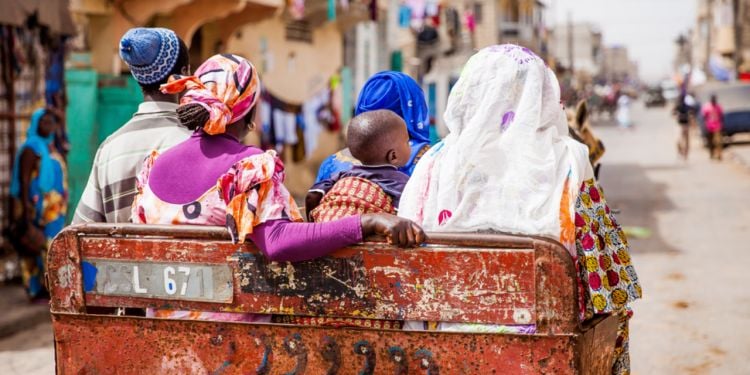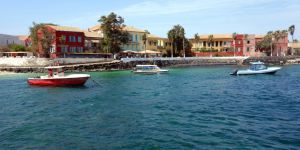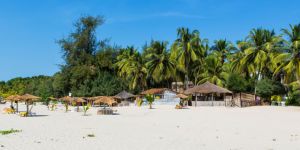
Whether for work or leisure, knowing how to move around the country is essential for all expats. In Senegal, there is a wide range of public transport options ranging from horse-drawn carts to light aircraft. What transport you use will depend on where you are going, what your budget is and how quickly you need to be there. In addition, many people rent or buy scooters or cars to get around.
The road network in Senegal
The majority of Senegal's road network is not tarmacked - they are sand and dirt tracks that connect rural villages and towns, as well as the backstreets of major cities. However, the main roads in Senegal - those that connect the major towns and cities - are all tarmacked. This includes the new 170km of motorway that has been built around Dakar, Thiès and Touba (the three largest cities in Senegal). The motorways are usually clear because locals prefer not to pay the toll and instead travel on the single lane national routes, which are often clogged up by trucks and buses.
Be careful when driving to avoid the many potholes, cracks and speed bumps. In addition, if you are driving on dirt roads, make sure to keep your distance as clouds of orange dirt emerge from every vehicle.
Boats in Senegal
As a coastal, fishing nation, there are a wide variety of boats in Senegal. Most locals use pirogues (wooden canoes), and there are supposedly more than 20,000 of them in Senegal. Expats will use these boats when exploring waterways or travelling small distances (from the mainland to Ile d'Ngor, for example). To get across the Sine-Saloum delta or cross the major rivers, there are many ferries.
There is also an overnight ferry service that connects Dakar to Ziguinchor in Casamance that travels twice per week. The ferry offers several different lodging options, but it is best to get a cabin of either 8,4 or 2 persons. A one-way ticket costs in a four-person cabin costs 26,500 CFA.
Intercity bus
There are bus stations in all Senegalese cities and towns. These generally operate on a 24/7 basis. Dakar has the country's most developed and efficient bus stations, but many other cities are just as active.
If you are planning a long trip across the country, booking is recommended. There are bus companies that offer air-conditioned, coach-style travel from Dakar to most major cities. They tend to charge extra for luggage.
Besides, you can take a local intercity bus, which is cheaper, but far less reliable and comfortable.
Sept-places
As the name suggests, the "sept-places" are seven-seater station wagons that are used as local ‘bush' taxis. These regularly go between all the major cities and towns and provide a cost-effective and less stressful journey than the local intercity buses. However, the "sept-places" won't leave until every seat has been sold, so sometimes you can wait a while to depart.
Trains
The old Dakar to Bamako line no longer exists, but a small train connecting Dakar, its suburbs and the new airport at Blaise Diagne is set to open soon.
Car Rapides
As the name doesn't suggest, these are not ‘fast cars'. In fact, they are a cross between taxis and buses that operate in Dakar. Converted from vans, they have no set route and tend to drive between downtown and the suburbs with Dakarois hopping off and on. Seen as a symbol of Dakar with their distinctive yellow and blue livery, they are gradually being phased out for being dangerous and heavy polluters.
Dakar Dem Dikk
Every year, millions of passengers travel by the Dakar Dem Dikk which provides about twenty lines and a thousand stops, not only across the capital city but also to neighbouring regions. They are reliable, but slow buses that cost very little.
Taxis
Taxis can be found everywhere in Senegal. Orange and black, some are new cars, some look like they belong on the scrapheap. Expect to see taxis with dents, broken dashboards and more wires protruding out of it than you might care for.
Taxis are generally very safe, but they can try and hustle you. You have to haggle the price before entering as they don't use a meter. As a general rule, try and say a price at the beginning and don't ask them ‘how much' as they will quote a much higher price than the usual fare.
From the airport to Dakar, there are set prices of 18,000 CFA during the day and 21,000 CFA at night. In Dakar, no taxi is ever more than 3,000-4,000 CFA (travelling from north to south).
Good to know:
Illegal taxis, also known as 'clandos', can be found in major Senegalese cities. You can spot them as they tend to be the worst cars (in terms of paint-job) on the road. Rates are cheaper, and they tend to operate in local neighbourhoods.
Rent a car
Car rental in Senegal can be very expensive, but appropriate if you are only making a short stay there. However, bear in mind that many roads are not always in great condition and accidents can happen, so make sure to get full insurance. Expect to pay the same price for petrol in Senegal as in many European countries.
Flights
You can fly from Dakar to Ziguinchor (45-minute flight) daily in a small, modern plane with Transair or Air Senegal. You can also fly to Banjul (in The Gambia) and other nearby cities.
Useful links:
We do our best to provide accurate and up to date information. However, if you have noticed any inaccuracies in this article, please let us know in the comments section below.







Comments